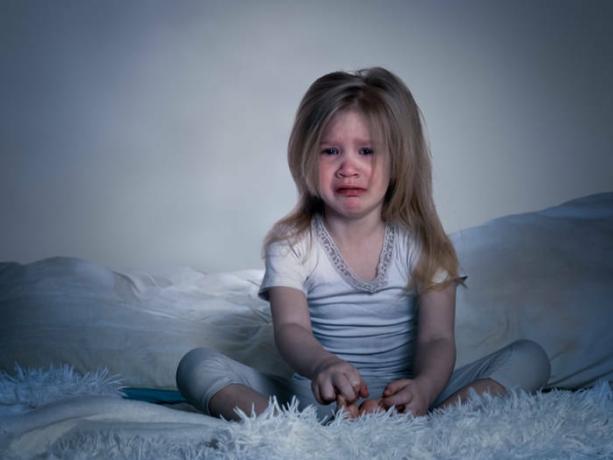What is the difference between night terrors and nightmares. Why is it wrong to wake up a child during night terrors? What should be done to prevent the appearance of night terrors in children
Children are very impressionable and have an indefatigable imagination. Probably every mother at least once heard stories from her baby about a monster under the bed. Starting from the age of two, these monsters seem to "sneak" into a child's sleep and cause such a phenomenon as night terrors. It looks quite frightening from the outside: a soundly sleeping child suddenly starts screaming loudly. At the same time, it is almost impossible to wake him up and calm him down, even when he opens his eyes, the baby does not understand anything and is as if in another world.
Night terrors and nightmares: what's the difference

Night terrors, unlike nightmares, the child does not remember / istockphoto.com
The main feature of night fears is that the child does not remember them at all. Episodes usually happen at night, 30-40 minutes after falling asleep (unlike nightmares that "come" in the morning). They can be repeated every night, but usually scare parents 2-3 times a week. At the same time, the picture is almost the same all the time: the child is sleeping peacefully and soundly, and suddenly begins to scream. At the same time, the face turns red, the heart is pounding, the body sweats. The baby can thrash about in bed, or maybe even jump up and try to run somewhere.
The episode itself can last from 30 seconds to 10 minutes (usually 2-4 minutes), while the child does not fully wake up. Even if you wake him up and try to calm him down, the look of the baby will be absent. He will be disoriented, will not be able to make contact and most likely will not recognize either the house or the parents. If you leave the child alone, he will fall asleep very quickly again, and the next morning he will not remember what scared him at night. This is another difference from nightmares, about which a child can often tell his parents in great detail.
Are night terrors dangerous for a child?

Night terrors are not dangerous for the psyche of the baby / istockphoto.com
Doctors classify night terrors as parasomnias, or sleep disorders. According to statistics, they occur in children from 2 to 15 years old, but the "peak" period falls on the age of 4 to 7 years. Boys are more susceptible to this disease. At the same time, night terrors are classified as “benign” disorders: they are not accompanied by mental disorders or problems of the nervous system. In rare cases, neurologists note increased anxiety and a neurotic personality type in children with night terrors. However, this does not affect the intelligence or developmental norms of the child.
The main causes of night terrors include:
- heredity (if one of the parents suffers from any sleep disorder, whether it be night terrors or sleepwalking, the likelihood of their occurrence in a child is very high)
- neuro-somatic weakness (if the child is very impressionable, prone to unrest and anxiety, suffers or previously suffered nervous tics)
- increased emotional stress (if a child has a lot of impressions during the day, without the regime is observed, the baby sleeps little and spends little time in the fresh air, sits a lot in front of TV)
- psychological factors (if the child has experienced or is in the process of experiencing stress, lives in an environment of constant conflict or feels manifestations of aggression)
How to help a child with night terrors

Daily routine and rejection of gadgets can help with night terrors / istockphoto.com
As a rule, night fears pass by themselves: in the process of maturation of the nervous system, episodes become less and less frequent, and gradually disappear. If they are not caused by a serious psychological reason (the same conflicts in the family or violence against the baby), such fears do not cause any damage to the child. You need to contact a specialist in case of very strong intensity and frequency of manifestation (for example, every night for several weeks). In other cases, you can try to deal with the problem yourself:
- First of all, do not wake the child during a night terror episode. No matter how much you want to help him, the nature of the phenomenon is such that it passes by itself and leaves no memories. Be close to him, stroke him and make sure that he does not hurt himself (for example, does not fall out of bed). After 5-10 minutes, the baby will calmly fall asleep further.
- Make sure that the child spends enough time in a dream: he gets enough sleep at night, sleeps as needed during the day. Overwork is one of the reasons that provokes the emergence of night fears.
- Establish a daily routine and alternating various activities. The child should spend as little time as possible watching cartoons or playing games on the phone. Mandatory rule: no gadgets at least two hours before bedtime. Devote this time to quiet games and reading books
- Analyze the causes that can provoke stress in a child, and try to eliminate or mitigate their impact. If these are quarrels with your husband, make it a rule not to swear in the presence of a child. If it is a kindergarten, talk to the teacher and psychologist about how to help the child adapt.
You will also be interested in reading:
How to deal with nightmares in a child: top tips
What is your child afraid of: fears of children at different ages



